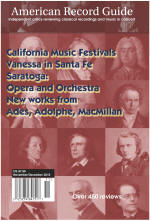Texte paru dans: / Appeared in: |
|
|
Outil de traduction ~ (Très approximatif) |
|
|
Reviewer: William
J. Gatens The title on this recording of motets by Andrea Gabrieli (c1532-85), “Music at San Marco”, is misleading if the listener is expecting a program of the composer’s polychoral works. Most of the music here comes from an early printed collection, Sacrae Cantiones (1565), that appeared the year before Gabrieli was appointed first organist at St Mark’s in Venice. It is a collection of five-part motets dedicated to Duke Albrecht V of Bavaria, ostensibly in hope of gaining an appointment with the Munich court. At this stage in his career, Gabrieli was strongly influenced by Orlando de Lassus. The two composers were named in the quartermaster’s list as part of the entourage that accompanied Duke Albrecht to the coronation of Emperor Maximilian II at Frankfurt in 1562. They remained lifelong friends. It was customary at that time for sacred polyphony to be performed by combinations of voices and instruments, and various combinations are heard here. The instrumental ensemble consists of a cornet, three trombones, and organ. In some instances voice parts are doubled, and in others the voices are replaced. A number of the motets are performed by the choir with a very unobtrusive organ doubling. The three-movement motet ‘Levavi Oculos Meos’ uses a different combination for each movement: solo voice with organ, a five-part ensemble of solo voices with organ, and the full choir with organ. The one motet that does not come from the 1565 set is the 10-part ‘Laudate Dominum in Sanctis Eius’, published posthumously in 1587. Its style is probably more in keeping with most listeners’ expectations of the composer. The performances here leave nothing to be desired in terms of technical polish. They are shapely, well paced, and expressive without subjective excess. The recorded sound is warm but clear. Admirers of Gabrieli will not be disappointed unless they want to be bowled over with reverberant polychoral waves of sound.
| |
|
|
|
|
Cliquez l'un ou l'autre
bouton pour découvrir bien d'autres critiques de CD |
|




